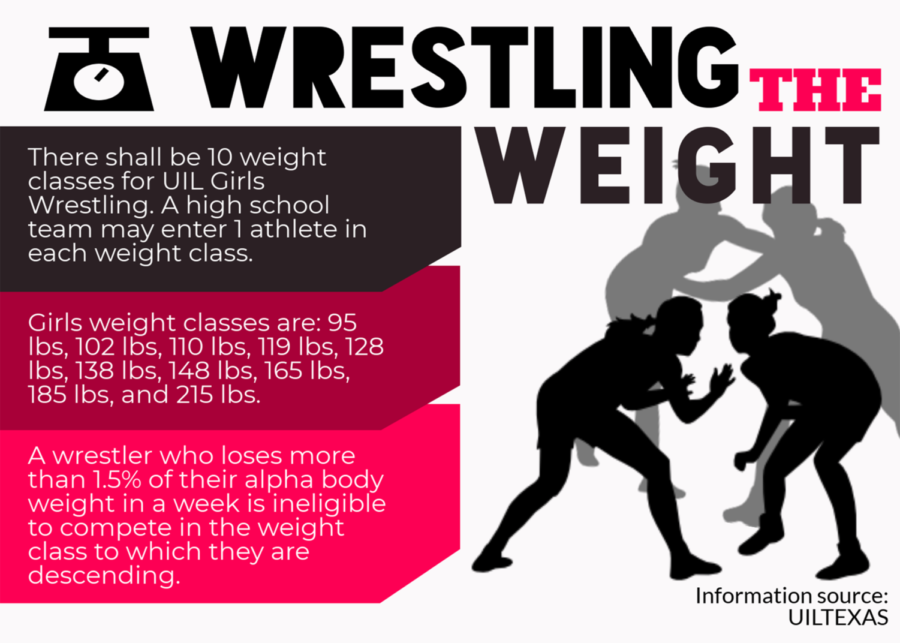For female wrestlers, losing weight is a source of positivity
Many wrestlers struggle with staying in their weight class. Sophomore staff writer Neha Desaraju talks about the impact weight classes have on female wrestlers.
February 6, 2019
Every week, Coppell High School senior Khushi Khandelwal tracks her weight methodically.
As a wrestler, she has to maintain a certain weight range, known as a weight class, in order to compete. Many times, this means losing weight.
Most of the time, Khandelwal is only losing water, which does not have a permanent effect on her weight; she gains this back mere hours after she eats. Instead, she wants to be at the lowest weight possible during weigh-ins so when she does gain the pounds back, she will most likely be heavier than her opponent, giving her an advantage.
“[Wrestlers] might lose a little water weight so they can make weight that one day but it’s nothing that’s going to stick,” CHS athletic trainer Yvette Carson said.
To do this, Khandelwal starts the beginning of the week with lots of water and a healthy meal or two, slowly eating less and less until the day of the tournament. She also runs with multiple layers to sweat out water.
And this is not uncommon among wrestlers, especially girls.
“[For me], it’s not really cutting weight. It’s just maybe not eating as much for dinner than night and it’s just so that you could compete against others that are your same weight class,” sophomore wrestler Devin Patton said. “I feel stronger if I’m going against girls that are my weight class compared to if I go to a heavier weight class and not eating as healthy as I should be.”
Other girls have a similar mindset.
“For girls, it is good,” junior wrestler Brooke Massaviol said. “It’s a good goal to set because it keeps them motivated.”
The girls also lose weight naturally through lifting or running during practice, so “it’s not always skipping meals,” according to Massaviol.
According to Carson, losing weight is much harder for girls than boys, since a female body reacts differently to weight deficits at different times, sometimes even putting on extra weight as padding. However, both Carson and wrestling coach Chip Lowery agree that in wrestling, there is a difference between cutting weight and losing weight.
“Cutting weight is an old term,” Lowery said. “Sometimes girls do have to maintain weight, and sometimes that might be monitoring what they eat, or eat after they weigh in.”
Lowery notes cutting weight is much different from losing weight, which happens naturally over the course of the season as body fat converts to lean muscle mass. It is also more permanent than cutting weight, which occurs primarily by losing a large amount of water weight.
“Running does that; yes, you’re going to sweat, and yes, you’re losing water at the same time,” Carson said.
However, the average person can lose up to 2.5 pounds just from an hour of exercise, and Carson stresses that just because you lose weight in water does not mean you are losing weight.
“It’s kind of one of those combos of losing weight and cutting it,” Carson said. “It’s a fine line.”
For some wrestlers, losing weight, either over the course of the week or year is something of both a mental game and a source of pride.
“I mean, I hate cutting weight,” Khandelwal said. “But it’s definitely worth it, because then I go up in tournaments and I win.”
However, skipping meals may not be the best way to cut weight.
“Metabolism is the key to losing weight,” Irving registered dietician Zarana Parekh said. “Your body is very smart. If you keep cutting calories it will first lower your metabolism.”
Parekh says to lose weight, she focuses on the quality of calories and food.
“The short period of time is what gets most people. It leads people to drastic measures. [Losing weight] is a lifestyle choice,” Parekh said.
Despite the widely publicized reports of the dangers of rapidly losing too much weight, for many Coppell girls’ wrestlers, maintaining weight has become more of an attainable goal than before joining wrestling.
“We have girls who are really proud of their body image and what they have become,” Lowery said. “They might come in here and say that girl has good muscle tone and that girl is strong. It gives them a goal and an image of, if they work out, who they can start to see in them. It absolutely does help with body image.”
In a number of combat sports, losing weight in an abnormally short time is a very real, controversial issue, but the coaches at CHS emphasize they do not require athletes to do things they are uncomfortable with and want to avoid their athletes cutting weight.
“We don’t tell them to lose weight,” Lowery said. “We don’t say you have to compete [at a certain weight], we usually follow a decent plan, and that’s where they’re going to be the best at.”











